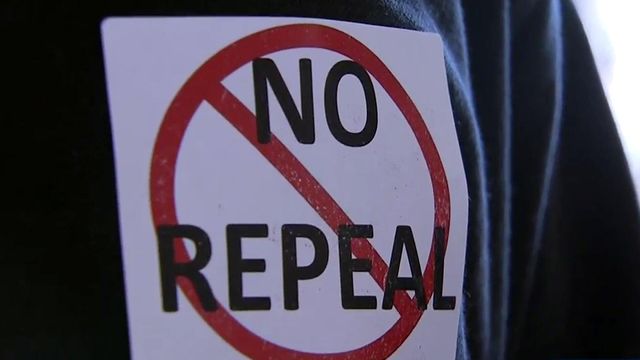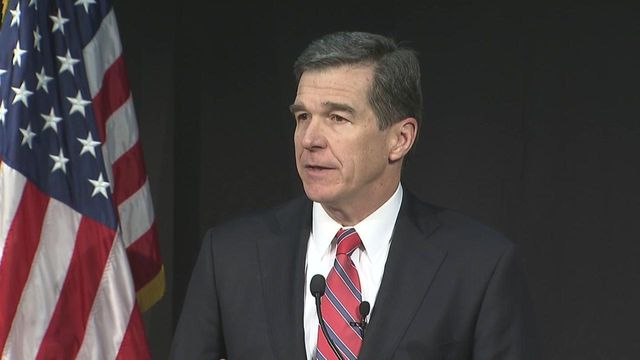HB2 repeal effort fails
A much ballyhooed plan to repeal a controversial state law that limits LGBT rights went down in flames Wednesday night after hours of negotiations between Republican legislative leaders and conservative members of their caucus and a last-ditch parliamentary maneuver to squeeze a bill through the Senate.
Posted — UpdatedThe failure of the repeal vote immediately led to finger-pointing, with Senate President Pro Tem Phil Berger accusing incoming Democratic Gov. Roy Cooper of scuttling the deal by urging Democratic senators to vote against it.
"Make no mistake: Roy Cooper and Senate Democrats killed the repeal of HB2, abandoning Roy Cooper’s commitment to avoid divisive social issues by shooting down a temporary cooling off period on ordinances like the one that got us into this mess last March," Berger, R-Rockingham, said in a statement. "Their action proves they only wanted a repeal in order to force radical social engineering and shared bathrooms across North Carolina at the expense of our state’s families, our reputation and our economy."
Republican Gov. Pat McCrory likewise claimed Democrats sabotaged the repeal.
"As I promised, I called a special session to reconsider a manufactured political issue that strategically targeted the city of Charlotte and our state by well-funded left-wing interest groups. This was at least the third time that pressure from the left sabotaged bipartisan good faith agreements for political purposes," McCrory said in a statement.
Cooper angrily responded by saying Republican lawmakers changed the proposal at the last minute, and he urged Democrats to stick to the deal that was brokered over the past week.
"The legislature had the chance to do the right thing for North Carolina, and they failed," Cooper said at a late-night news conference. "This was our best chance. It cannot be our last chance."
People on both sides of the debate were quick to react.
The North Carolina Values Coalition praising lawmakers for standing firm behind House Bill 2 and "stopping the move to cower and cave-in" to groups pushing for a repeal. Meanwhile, the American Civil Liberties Union said it would move forward with its federal challenge to the state law.
"It is a shame that North Carolina’s General Assembly is refusing to clean up the mess they made," James Esseks, director of the ACLU’s LGBT & HIV Project, said in a statement. "The legislature may not be willing to undo their unconstitutional overreach and respect the rights of LGBT people, so we’ll just have to see them in court."
Charlotte officials expressed disappointment over the repeal's failure and said they would continue supporting diversity.
"Our commitment to maintaining and protecting diverse and inclusive communities remains unchanged," city leaders said in a statement via Twitter. "We will continue to work with our partners at the state and local levels to develop a solution that protects the rights of all individuals."
Lawmakers irked by special session
The General Assembly enacted House Bill 2, the Public Facilities Privacy & Security Act, in a one-day emergency session in March to nullify a Charlotte ordinance that required businesses in the city to allow transgender people to use the bathroom of their choice. But the state law also barred the LGBT community from nondiscrimination protections, setting off national criticism that led to canceled concerts, conventions and athletic events.
State Republican leaders have said for months that, if Charlotte lifted its local ordinance, a repeal of House Bill 2 would follow. On Monday, the Charlotte City Council voted to repeal the ordinance if state lawmakers acted by Dec. 31 to repeal the state law, prompting McCrory to call for a special session of the General Assembly to do just that.
Lawmakers were irritated from the start over the special session, however.
Rep. Jeff Collins, R-Nash, filed a formal protest, calling the session unconstitutional because there was no "extraordinary circumstance" that warranted Gov. Pat McCrory from bringing lawmakers back to Raleigh for their fifth special session of the year.
"The only extraordinary thing that has happened is the extraordinary hubris of a city council that the General Assembly act by a certain date," Collins said.
"When did we give authority to city councils to call us into session?" Collins asked, noting lawmakers spent part of last week trying to reclaim some authority previous legislatures had ceded to governors.
"We shouldn't even be here," said Rep. Larry Pittman, R-Cabarrus, who joined in the protest.
Rep. Michael Speciale, R-Craven, who also joined in the protest, tried to adjourn the House session before any actions could be taken, but House Speaker Tim Moore ruled him out of order.
House and Senate Republicans spent much of the day in closed-door meetings hashing out concerns over a potential repeal.
Berger filed a bill Wednesday afternoon linking a repeal to a six-month "cooling-off period" in which North Carolina cities and counties would be barred from passing nondiscrimination ordinances, and the bill immediately went to the Senate floor for debate.
"For nine-months, the cloud of HB2 has hung over our state," said Sen. Mike Woodard, D-Durham. "A six-month moratorium is not what we came here to do. It just prolongs the cloud."
Woodard was among several Democratic senators who filed a bill calling for a full repeal of House Bill 2, but that measure was referred to a committee and never heard.
Berger said the moratorium – he later extended it to last throughout the General Assembly's 2017 session – would give lawmakers a chance to work on a long-range solution.
"We take the state back to the status quo that existed before Charlotte passed its ordinance," he said, equating the measure to hitting "the reset button."
"We're not back to where we were before HB2," said Sen. Floyd McKissick, D-Durham. "This doesn't put us back on the same standing, the same solid ground."
McKissick said he worried that the moratorium morphs into a permanent ban on such ordinances in the coming months while lawmakers are in their regular 2017 session. He said such ordinances have been important over the years to "people who look me" to be able to eat, drink, sleep – and even go to the bathroom – where they wanted.
Sen. Gladys Robinson, D-Guilford, said House Bill 2 has cost her constituents through a smaller High Point Furniture Market and the loss of Atlantic Coast Conference and NCAA tournament games, and nothing less of a full repeal was sufficient.
"We're playing games again with people and their lives," Robinson said.
Cooper said he had worked for more than a week to broker a deal that lawmakers on both sides of the aisle, Charlotte leaders, LGBT advocates, business executives and sports leagues such as the NBA could accept. By adding the moratorium, he said, Berger broke the GOP's promise to repeal House Bill 2 if Charlotte dropped its ordinance.
"What they were trying to do was tack on something that wouldn't work," he said, adding that a moratorium blocking local nondiscrimination ordinances is "mostly what HB2 was."
Sen. Jeff Jackson, D-Mecklenburg, angrily denounced the Senate bill, saying lawmakers weren't upholding their end of the bargain.
"This wasn't the deal. The deal was simple," Jackson said. "This bill breaks that deal."
Sen. Harry Brown, R-Onslow, said the moratorium is needed to prevent the Charlotte City Council from reinstating its ordinance next week or next month.
Charlotte council clarifies action
In an emergency meeting Wednesday morning, the Charlotte City Council sought to clarify its Monday night vote to repeal its transgender nondiscrimination ordinance.
Charlotte's action on Monday "turned back the clock" on the city's list of people with protected status, removing protections based on marital status, family status, sexual orientation, gender identity and gender expression, city attorney Robert E. Hagemann told the council on Wednesday.
"You did repeal all the public accommodation ordinance on Monday," Hagemann said.
However, the council's action left on the books a portion of the February ordinance that was not pre-empted by House Bill 2. By a 7-2 vote Wednesday, the council removed those parts from city code as well, and the Dec. 31 time limit for the General Assembly to act was eliminated.
Councilman Ed Driggs issued a statement late Tuesday saying the council "acted in good faith to do everything that it understood was necessary to facilitate the repeal of HB2."
"“There was no effort on the part of council to preserve or protect any portion of the city code that was in conflict with that understanding," Driggs said. "If the General Assembly needs us to consider doing more, we ask for a clear explanation of exactly what that entails. If necessary, Charlotte City Council will act to address any unintended omissions from the ordinance it passed on Monday."
Lawmakers weren't convinced about the sincerity of Charlotte's leaders, however.
"I have no faith in the city of Charlotte at this point," said Sen. Buck Newton, R-Wilson, referring to Charlotte council members who passed the transgender nondiscrimination ordinance as "the lunatic left."
Senate maneuver fails
Senators were prepared to vote twice on Berger's bill when he called for a 10-minute recess each time. The first lasted more than two hours and the second for a half-hour.
He then offered to split the vote in two – a straight-up vote on repealing House Bill 2 and a vote on the moratorium. Both votes would have to pass for the bill to clear the Senate and head to the House.
"What you’ve had before you today is not some gimmick to create the best of both worlds. It is a good faith effort – given the passion and disagreement surrounding this issue – and it is a reasonable solution that puts HB2 behind us while providing some time to work out some of these broader tensions," he said.
He then told Democrats in the chamber they had spent the year using House Bill 2 as a political wedge issue after walking out of the Senate in March and refusing to vote when the law was adopted.
"Surely you understand why there’s still doubt about whether you really want to repeal House Bill 2 and start over, or if you just want to get your way and continue to scream at Republicans," he said.
Yet, Republicans and Democrats alike treated Berger's maneuver with skepticism. Sen. Ralph Hise, R-Mitchell, said it would allow a bill without majority to support to pass the Senate.
The repeal vote failed 16-32, with Democrats joining conservative Republicans to defeat the measure. No vote was cast on the moratorium portion of the bill.
Stunned and angry senators then adjourned, and the House followed suit a short time later.
"I don't know if you think the public is stupid or we're stupid," Sen. Angela Bryant, D-Nash, said to Republican senators, calling the repeal effort "smoke and mirrors" and "a mirage."
Lawmakers bemoaned wasting a day in session without accomplishing anything.
"This was a missed opportunity," said Sen. Floyd McKissick, D-Durham. "It looks like we're sanctioning discrimination."
Sen. Dan Blue, D-Wake, was more blunt, saying the Republican majority needed to get its act together before bringing lawmakers to Raleigh.
"Hopefully in the future, before these things are done, you people will have a better plan," Blue said, calling the session "an absolutely unforgivable abuse of our time."
Related Topics
• Credits
Copyright 2024 by Capitol Broadcasting Company. All rights reserved. This material may not be published, broadcast, rewritten or redistributed.






